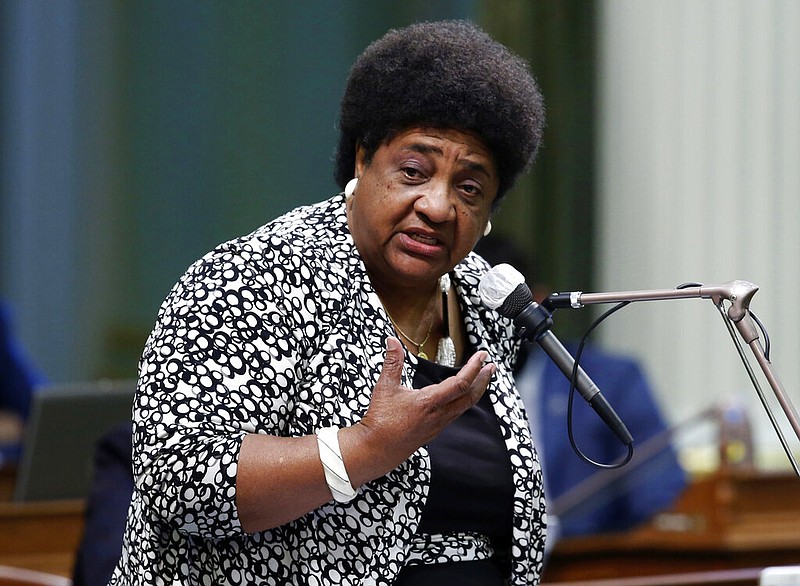Shirley Weber, a California state legislator nominated earlier this week to become the state's top elections officer, has spoken about how racism in Arkansas led her family to migrate to California.
Weber, 72, is to become the first Black woman to hold the post of secretary of state in California after a nomination by Gov. Gavin Newsom. She represents an area that includes San Diego, and she will replace Secretary of State Alex Padilla, who is departing to fill the U.S. Senate seat being vacated by Vice President-elect Kamala Harris.
Born on a 100-acre farm in Hope, Weber said in an online appearance with Newsom on Wednesday that her family fled for California "because my dad was going to be lynched in Arkansas."
In 2008, Weber participated in an oral history project at San Diego State University, where she worked for more than four decades as a professor and served as chairman of the university's Department of Africana Studies.
Weber in the 2008 interview gave more details about her family's farm life in Arkansas before they fled when she was 3 years old.
She described her father as someone who "never let anyone call him 'boy.'"
"He'd be standin' there, and a guy would walk up and say, 'Hey you boys, I need somebody to clear my field.' Now, my family owned property in Arkansas, and they still do," Weber said in the 2008 interview. "But in those days, even if you owned your own property, in order not to demonstrate ever that you were above or equal to whites, you had to work their fields, so that even if you didn't need to financially, you had to work their fields, because they were not going to allow you to demonstrate that you were an independent person."
But her father, David Nash, a native Arkansan, would not clear their fields, she said.
"And that would upset them, obviously. And so people's perception was, 'Your daddy's gonna get killed. He's crazy, he's not like the rest of 'em.' And his brothers would make excuses and apologies and so forth and so on, and they would clear the fields. But my father refused to clear anybody's fields but his own. And so he knew then he was not destined to live long in Arkansas," Weber said in the 2008 interview.
In the recent online appearance, Weber said her grandfather never voted and died before passage of the 1965 Voting Rights Act, which banned racial discrimination at the ballot box.
"This is an extremely important issue for me," Weber said during the online appearance. "My grandfather never got a chance to vote. ... My dad never voted until he came to California in the (19)50s."
Weber said those experiences shaped her father's priorities for his children. He had a sixth-grade education and could barely read but "he made clear that we knew that those things are extremely important, going to school, doing the best you could but also exercising your right to vote."
After moving to Los Angeles, her parents used their home as a polling place on Election Day, and she recalls them rearranging furniture to make room for voting equipment.
"My dad was so proud. My mom was so proud. And as a family we knew on Election Day, go through the back door because people are ... voting in the living room. And that was just a part of our culture -- we valued the vote."
Weber, a Democrat like Newsom and Padilla, served as a member of the San Diego Board of Education from 1988-96. Since 2012, she has held the state Assembly seat in the 79th District in San Diego County.
In the Legislature, Weber was a lead proponent of a ballot proposal to restore affirmative action -- it was rejected by voters last month. She also authored a law, signed by Newsom in September, that creates a task force to come up with proposals for how the state could provide reparations to Black Americans, what form those reparations might take and who would be eligible to receive them.
Weber will go to the secretary of state's job after Padilla became recognized nationally for voting reforms and presided at a time of record voter enrollment and participation. Under his watch, the state hit 22 million registered voters.
Also looming is a proposed recall election that could drive Newsom from office. Recall organizers say they have collected more than half of the nearly 1.5 million petition signatures needed to place the recall on the ballot, and they have until mid-March to hit the required threshold.
The secretary of state -- soon to be Newsom's appointee, Weber -- oversees the process for the recall to qualify for the ballot.
Weber said she was eager to continue expanding voter rolls and rights, especially "in these very difficult times when people are challenging the right to vote, challenging our system itself and trying to destroy democracy."
"My family knows what it is like when people deny you that right," she said.
Information for this article was contributed by The Associated Press.
